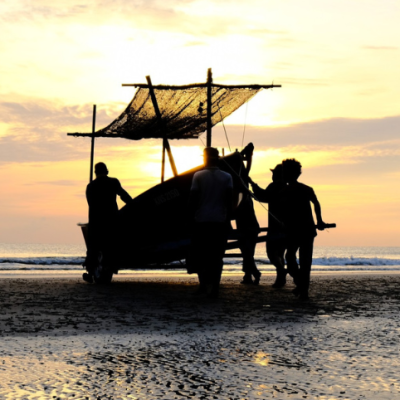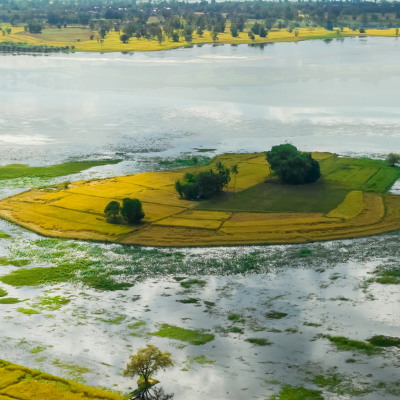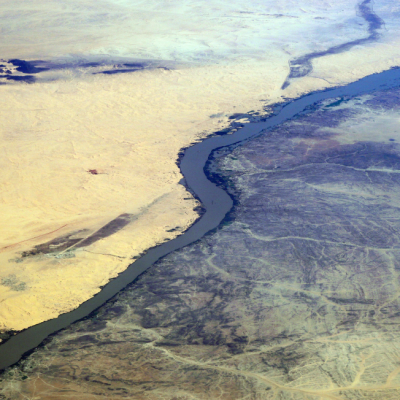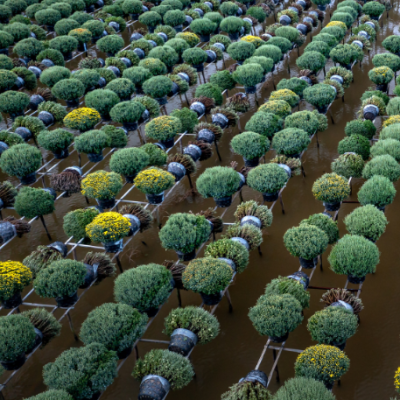How we achieve impact
“What gets measured gets managed.”
This famous quote by management thinker Peter Drucker underscores why GWP’s work on supporting the progress indicators associated with SDG target 6.5 – implementing IWRM at all levels – is so centrally important. We are past the halfway point in the 2030 Agenda’s timeline, and according to the data assembled by GWP in partnership with UNEP, UNEP-DHI, and UNDP Cap-Net – through the SDG 6 IWRM Support Programme – the world needs to double its rate of progress.
Assessing progress on water management, like water management itself, is a challenge that requires a great deal of cooperation between agencies and interest groups. GWP assists countries to facilitate the necessary multistakeholder consultations to assess and report on their progress on SDG indicator 6.5.1. The countries then use this reporting to plan for relevant IWRM actions and enable their implementation, increasing country performance on this key SDG indicator.
Good management also requires sound leadership, and GWP also continues to implement the Global Water Leadership in a Changing Climate programme (GWL), alongside UNICEF, SWA, and JMP. In 2023, GWP worked intensely in seven countries, bringing together key stakeholders and decision-makers from two water management pillars – water resources and water and sanitation – to develop holistic, integrated policies and plans for enhancing national water and climate resilience.
Key achievements
- In 2023, GWP assisted the governments of 67 countries in facilitating multistakeholder consultations to determine the status of SDG indicator 6.5.1 on IWRM, involving over 2,700 stakeholders in the process. GWP also launched a new online tool for gathering multistakeholder input on the indicator on the IWRM Action Hub, a tool that was used by 13 countries.
- A GWP presentation during the 38th meeting of UN-Water, focused on recommendations on how to accelerate innovation under the SDG 6 Global Acceleration Framework, led to the creation of a GWP-co-chaired task force on innovation to shape the future of water innovation for SDG 6.
- GWP was a catalytic presence at the UN 2023 Water Conference, engaging its extensive network in leading and co-convening 26 official side events. Along with its network, GWP submitted or partnered with other organisations to submit over 35 commitments to the Water Actions Agenda.
- GWP assisted the governments of North Macedonia, Nicaragua, Botswana, Paraguay, and Tunisia to formulate action plans that are based on the results of SDG indicator 6.5.1 monitoring and represent appropriate multistakeholder responses to water resource management challenges.
- GWP, as part of its contribution to the SDG 6 IWRM Support Programme, finalised a study with the Ministry of Water of Tanzania to highlight the value of water to Tanzania’s economy in three sectors, concluding that those three sectors alone contribute at least 3.31 percent to the economy. This study was a first of its kind and creates a model for other countries to follow.
- Also on behalf of the SDG 6 IWRM Support Programme, GWP conducted a Learning Journey on Financing for Water Security through its Community of Practice on the IWRM Action Hub, bringing in over 350 participants through online events, blog posts, online discussions, and more, to agree on four key messages on how to increase financing for water security, supported by tangible examples and case studies.
GWP continued its global leadership on water and climate work in 2023, primarily through a suite of projects under the Water, Climate, Development – Gender Programme (WACDEP-G), the Integrated Drought Management Programme (IDMP), the Associated Programme on Flood Management (APFM), the GCF Readiness programme, the NDC implementation support programme, and the WASH Climate Resilience Programme – all implemented by GWP and partners.
Between 2020 and 2023, GWP supported over 43 countries to mobilise more than EUR35 million in climate finance to strengthen climate resilience through water, including from the GCF, Adaptation Fund, GEF, the NDC Partnership and others. In 2023, GWP continued to strategically support countries to utilise secured climate finance in a catalytic manner to enable preparation and implementation of transformative, paradigm-shifting water and climate resilience programmes and investments.
GWP continues to be central in advancing the Africa Union’s Continental Africa Water Investment Programme (AIP), serving as its Secretariat. In 2023, the AIP’s International High-Level Panel on Water Investments for Africa released the major report Africa’s Rising Investment Tide during the UN 2023 Water Conference, exploring how investment partnerships can mobilise USD30 billion a year to achieve water security and sustainable sanitation in Africa. The High-Level Panel then launched its Investment Action Plan during GWP’s extensive involvement at COP28.
Key achievements
- GWPO prepared a successful submission to the GCF resulting in a USD1.5 million Project Preparation Facility grant to GWP Southern Africa for a regional water investment programme covering 13 countries in the Southern Africa Development Community.
- To create better conditions for mobilising resources to implement water programmes and projects in Africa, and to strengthen capacity to coordinate water policy across the continent, a memorandum of understanding was signed between the African Union Commission and GWP Southern Africa, which hosts GWP’s Africa Coordination Unit. The MOU enhances collaboration among the parties and was facilitated by the Continental Africa Water Investment Programme (AIP).
- During the UN 2023 Water Conference, the Presidential Changemaker Awards of the Water Changemaker Awards 2023 were presented to representatives of the AIP High-Level Panel for their demonstrated leadership and commitment for climate resilient water investments. Winners of the Water Changemaker Innovation Award – for the most promising climate innovations with the greatest potential for scale, replication, and further investment to support a water-secure world – were later presented at COP28.
- GWP provided technical support to the Peruvian Ministry of Environment to develop the country’s National Climate Change Strategy, and to Paraguay’s Mitigation Department of the National Directorate of Climate Change, to articulate priority actions for implementing the country’s Nationally Determined Contributions’ sectoral mitigation plans.
- GWP carried out capacity development for real-time flood monitoring in Botswana, Mozambique, South Africa, and Zimbabwe, bringing these countries a step closer to operationalising a Flood Forecasting and Early Warning System in their river basins.
Cooperating over boundaries is essential for water security and peace and requires a great deal of hands-on facilitation and continuous relationship-building. The GWP Network has decades of experience in this work and continued to provide multiple forms of support to six regional organisations and nine transboundary water management institutions in 2023. Considering that 60 percent of global freshwater flows are found in transboundary basins, shared among 153 states, and that their management is still far from ideal, GWP’s dedicated efforts to advance transboundary cooperation is critical for global progress in this area.
Key achievements
- GWP was one of the establishing members of the Transboundary Water Cooperation Coalition, a multistakeholder coalition protecting and better managing transboundary waters in all basins and connected coastal systems worldwide.
- A new USD7.1 million, five-year project, implemented by GWP, was approved by GEF. The project focuses on transboundary cooperation in the Drin Basin to support the implementation of the Drin Strategic Action Programme and enable countries to coordinate action at the basin level.
- GWP published Multistakeholder Regional Dialogues: Pathways for Advancing Transboundary Water Cooperation, which reflects on factors that enable multistakeholder dialogues to positively influence transboundary cooperation.
- The governments of Mozambique and Zimbabwe signed the BUPUSA Water Courses Commission Establishing Agreement in May 2023, a process closely supported by GWP. The agreement allows for coordinated management, protection, and utilisation of the Buzi, Pungwe, and Save tri-basin, and puts both countries in a better position to react to hazards.
- The Minister Council of the Central American Commission of Environment and Development validated a set of Regional Guidelines on the Principles of Cooperation for Transboundary Water Management in the Central American Integration System in 2023. GWP played a crucial role in the facilitation of this process, which was initiated at the first regional dialogue in 2019.
True water security is not possible without adopting inclusive and participatory approaches. Through its Gender Strategy, GWP has continued to employ the ‘never without them when about them’ approach to achieving a water secure world.
Furthermore, GWP’s signature Water, Climate, Development – Gender Programme (WACDEP-G), implemented across Benin, Cameroon, Tunisia, Uganda, and Zambia, aims to promote gender equality by strategically integrating gender-transformative planning and decision-making into climate-resilient water infrastructure projects. Since the initiation of WACDEP-G in 2020, GWP has increasingly been able to influence the mainstreaming of gender into planning and investment processes.
Key achievements
- Thanks to facilitation by GWP in West Africa, gender was incorporated in the Volta Flood and Drought Management Strategy and the Volta Basin Gender and Flood End-to-End Early Warning System Action Plan.
- Through the SDG 6 IWRM Support Programme, GWP piloted a gender mainstreaming checklist in Uganda, Cameroon, and Lebanon to ensure that gender is a central part of SDG 6 monitoring and achievement.
- Through the Global Water Leadership Programme, GWP conducted a stakeholder and gender analysis to map the stakeholders and their meaningful participation in planning and decision-making processes in Nepal. The analysis will support the development of gender equality and social inclusion policies to ensure the participation of women in multistakeholder change processes.
- GWP ensured the incorporation of gender in an IWRM Action Plan that was developed and approved by the Guatemalan Ministry of Environment and Natural Resources.
- GWP is supporting 13 Southern African Development Community (SADC) Secretariat countries to develop a Green Climate Fund investment proposal for a SADC Gender-Transformative Water Investment Programme.
GWP continued its engagement with young people throughout 2023, recognising their vital role and immense potential as both beneficiaries and active partners towards a water secure world. GWP also continued to host and support the moderation of several active youth Communities of Practice in 2023, giving young practitioners places to connect and learn together. While diverse in scope and ambition, GWP’s youth portfolio has the common objective of advancing SDG 6 implementation by supporting and enhancing young people’s contributions to water resources management through youth empowerment, and building institutional capacity for youth inclusion in decision-making.
Key achievements
- GWP held a three-month training programme in the Caribbean between July and September 2023 as part of its Water Academy for Youth programme. The experience provided theme-specific mentoring to young professionals to empower them to take IWRM actions in their regional context.
- GWP provided support to national and regional youth organisations across West Africa to hold national workshops that allowed them to develop their contributions to the United Nations 2023 Water Conference.
- GWP launched the South Asia Youth Water Challenge 2023, sponsored by Brandix. The winning team was awarded USD2,500 to implement an innovative rainwater harvesting solution with integrated smart technology, enabling real-time water quality monitoring.
- The 2023 Summer School in Central and Eastern Europe, hosted in Prague, Czechia in July 2023, gathered 21 MSc and PhD students from 17 countries to expand their practical knowledge and skills to support the implementation of natural, small, and underutilised water and nutrient retention measures.
The 2020–2025 global GWP Strategy sets an objective for the GWP Network to engage the private sector in water resources management, including mobilising investment, reducing negative impacts, and promoting innovation and entrepreneurship. Throughout 2023, GWP continued with its global and network-wide efforts to forge win–win partnerships with the private sector.
Key achievements
- GWP committed itself to the Forward Faster Water Resilience initiative, as one of four official partners. Through this initiative, private companies are encouraged to commit to accelerating action to achieve the objectives of the Water Resilience Coalition and achieve net positive water impact in more than 100 water-stressed basins by 2030.
- In Uruguay, GWP launched the Water Footprint Verification Programme in June 2023, in partnership with the Chamber of Industries and the regional certification organisation LSQA, to promote efficient water management in productive processes. Six companies have been certified so far.
- Two agricultural communities in Heraklion, Crete, Greece were supported through the Zero Drop programme, implemented by GWP Mediterranean and financed by The Coca-Cola Foundation and Coca-Cola Hellenic Bottling Company. A new piping system was installed and the pumping station equipment was upgraded, which each year will benefit the population of 200,000 residents, saving 14.5 million litres of water and 30 kilograms of carbon dioxide emissions.
- A series of workshops in Sri Lanka supported private sector banks with the process of accreditation by the GCF to become Direct Access Entities, which helps them towards eligibility to receive GCF readiness support.






